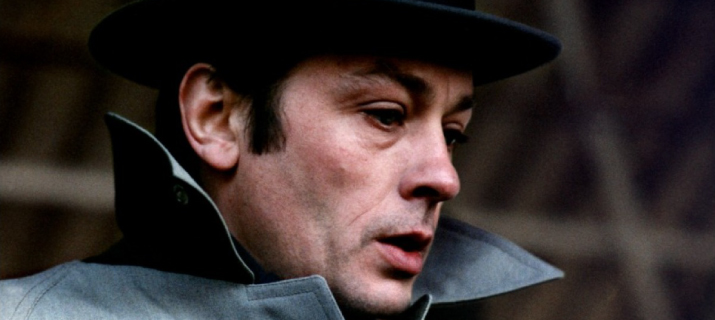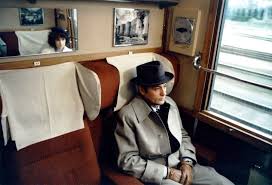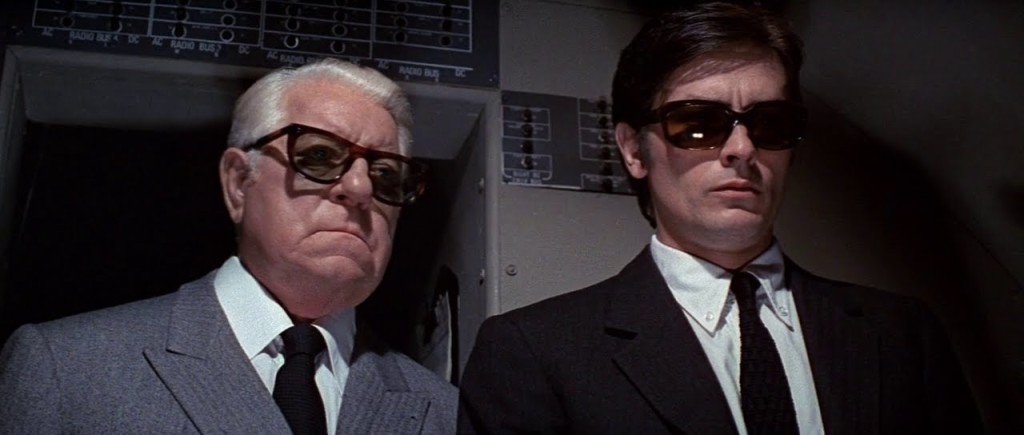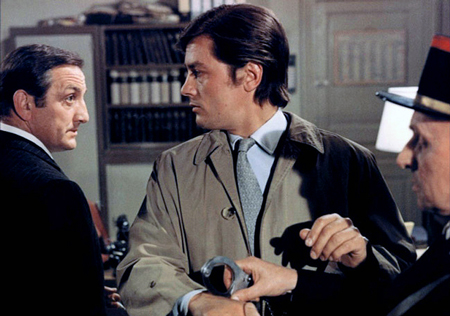
Here’s a chance to see a brilliant movie almost nobody has seen in 43 years. The Roxie and BAMPFA are screening Joseph Losey’s slowburn thriller Mr. Klein, a searing critique of French collaboration with the Nazis. Mr. Klein stars Alain Delon as a predator trapped by his own obsession.
To make sure we understand the stakes, Mr. Klein opens with a sobering pseudo-medical exam, absurdly intended to determine if a woman is Jewish; the waiting room overflows with others awaiting the humiliating and terrifying “examination”.
Only then do we meet Robert Klein (Delon) in his splendid silk dressing gown, living in an opulent Paris apartment with his randy mistress. Klein is a bottom feeder who profits from the desperation of Jewish art collectors; when they flee France to escape the Nazis, Klein unapologetically buys their art at rock bottom prices.
Then Klein gets a Jewish newspaper delivered to his door. He is Alsatian and his name is Klein, but some Jews are named Klein. There is another Robert Klein – a Jewish Klein. What is the extent of the mistaken identity? Is it inadvertent, or is someone trying to paint Klein as Jewish? Who is this other Robert Klein, and is he masterminding a frame job? Klein hits the streets in his trench coat and fedora, trying to solve the mystery himself.
Klein’s journey becomes surreal and then Kafkaesque, as what he thinks is a whodunit is interspersed with clips of the ever more riuhkess French police hunting down Jews. Klein, at first only vaguely understanding that he, too, is at risk, is racing against the clock.
The improbably handsome Alain Delon has eyes that can switch off any glimmer of empathy – perfect for playing sociopaths. The best analysis of Delon’s gift is Sheila O’Malley‘s.
Mr. Klein showcases Delon at 41, after his iconic run of Jean-Pierre Melville crime classics: Le Samourai, Le Cercle Rouge and Un Flic. Seven years earlier, he had been able to play the young guy matched with Jean Gabin and Lino Ventura in The Sicilian Clan. Now, even with his still dazzling looks, Delon has the weight of a life lived into his forties.
Mr. Klein also features a slate of French actresses: the great Jeanne Moreau, Francine Bergé, Juliet Berto and Francine Racette. Michael Lonsdale, so good in The Day of the Jackal three years before, is also excellent here (and has his own luxurious dressing gown).
Joseph Losey and his regular cinematographer Gerry Fisher keep both Robert Klein and the audience off-balance, bouncing between Klein’s richly-colored apartment, his surreal dreamlike visit to a country estate, the noirishly mysterious haunts of the other Klein and a starkly realistic depiction of France’s most unpleasant history. Losey ironically inserts an Alsatian dog. It all culminates in Klein’s one final miscalculation.
Losey’s 1947 directorial debut was the political parable The Boy with the Green Hair. In 1951, he remade M with an inventive basement-to-roof exploration of Los Angeles’ storied Bradbury Building. Later that year, he turned the usually sympathetic good guy Van Heflin into the twisted bad guy in The Prowler. After being named at HUAC, he was blacklisted and, in 1953, successfully set up shop in Europe. His The Go-Between won the Palm d’Or at Cannes, and he made four of Dirk Bogarde’s most notable movies in the late 1950s and 1960s. He was 67 when he directed Mr. Klein.
Mr. Klein depicts the historical Vel’ d’Hiv roundup, when French police swept up over 11,000 Jews on the same day, July 16, 1942, and detained them in a stadium, the Velodrome d’Hiver; they were then transported to Auschwitz to be murdered.
French audiences in 1976 did not want to be reminded that collaboration was a mainstream phenomenon. Mr. Klein depicts French police enthusiastically hunting down Jews, theater patrons laughing heartily at a grotesquely anti-Semitic farce, and regular Parisians nonchalantly lining up for bread at the boulangerie indifferent to Jews being bused off to concentration camps.
Mr. Klein was nominated for seven Césars (the French equivalents of Oscars) and won best film and best director. Until this reissue by Rialto Pictures, Mr. Klein has essentially been a lost film. It is not currently available on the major streaming platforms, nor can it be found on DVD, except for some bootlegs from Asia.
Mr. Klein will play at BAMPFA in Berkeley on December 4, 14 & 18 and at San Francisco’s Roxie December 6-12.



